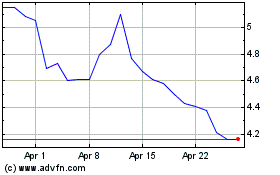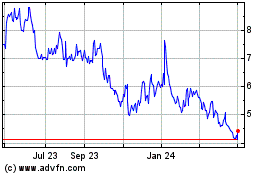BioCryst Receives Additional $3.5 Million to Fund Clinical Trials of Galidesivir in Yellow Fever
September 17 2018 - 7:00AM

BioCryst Pharmaceuticals, Inc. (NASDAQ:BCRX) today announced that
the National Institute of Allergy and Infectious Diseases (NIAID),
part of the National Institutes of Health, has awarded BioCryst an
additional $3.5 million to support clinical trials of galidesivir
in patients with yellow fever. Yellow fever represents a
significant unmet medical need and a new potential use of
galidesivir.
With this additional $3.5 million contract
amendment, the NIAID development contract for galidesivir now
totals $43.0 million.
BioCryst has global rights to galidesivir, a
broad-spectrum antiviral drug in development for the treatment of
Marburg and Ebola viral diseases. In a phase 1 trial of clinical
safety and pharmacokinetics in healthy subjects, galidesivir was
safe and well tolerated. In animal studies, galidesivir also has
demonstrated survival benefits against Marburg, Ebola, yellow fever
and Zika viruses.
With the additional NIAID funding, BioCryst
plans to assess the safety, tolerability, pharmacokinetics and
effectiveness of galidesivir in human subjects with yellow fever,
and to determine a safe and effective dose for further evaluation
of galidesivir in Marburg or Ebola infection.
Yellow fever is a serious infectious disease,
endemic to tropical areas of Africa and Central and South America,
and responsible for up to 170,000 severe cases and up to 60,000
deaths annually, according to the World Health Organization.
There is no approved treatment for yellow fever and immunization
has been hampered by global yellow fever vaccine shortages.
In Brazil, recent seasonal outbreaks of yellow
fever, which have extended into urban areas, have put more than 35
million people at risk for contracting the disease. The Brazilian
Ministry of Health has confirmed 2,043 cases and 676 deaths due to
yellow fever since December 2016.
“We appreciate the NIAID’s expanded support for
galidesivir, which allows us to evaluate our broad-spectrum
antiviral in clinical trials in patients suffering from yellow
fever. This program could prove to be very valuable in the overall
evaluation of galidesivir for inclusion in the Strategic National
Stockpile,” said Jon Stonehouse, chief executive officer of
BioCryst.
The galidesivir development program project is
substantially funded by the NIAID and the Biomedical Advanced
Research and Development Authority (BARDA), a part of HHS’s Office
of the Assistant Secretary for Preparedness and Response.
Since September 2013, NIAID has supported BioCryst, making
significant advances toward developing galidesivir as a therapeutic
for Ebola virus disease and Marburg virus disease under contract
number HHSN272201300017C. Since March 2015, BARDA has supported the
galidesivir development program under contract number
HHSO100201500007C, for the continued development of galidesivir as
a potential treatment for filoviruses. The total BARDA
contract value to advance the program through new drug application
enabling toxicology studies and manufacturing is $39.1 million, if
all contract options are exercised.
About Galidesivir
(BCX4430)Galidesivir is a broad-spectrum antiviral in
advanced development under the Animal Rule for the treatment of
Marburg and Ebola viral diseases. A phase 1 clinical safety and
pharmacokinetics trial in healthy subjects has been completed and,
in animal studies, galidesivir has demonstrated survival benefits
against a variety of serious pathogens, including Ebola, Marburg,
yellow fever and Zika viruses. Galidesivir has also demonstrated
broad-spectrum activity in vitro against more than 20 RNA viruses
in nine different families, including filoviruses, togaviruses,
bunyaviruses, arenaviruses, paramyxoviruses, coronaviruses and
flaviviruses. BioCryst is developing galidesivir in collaboration
with U.S. government agencies and other institutions.
About BioCryst Pharmaceuticals
BioCryst Pharmaceuticals designs, optimizes and develops novel
small-molecule medicines that address both common and rare
conditions. BioCryst has several ongoing development programs
including BCX7353, an oral treatment for hereditary angioedema,
galidesivir, a potential treatment for filoviruses, and a
preclinical program to develop oral ALK-2 inhibitors for the
treatment of fibrodysplasia ossificans progressiva. RAPIVAB®
(peramivir injection), a viral neuraminidase inhibitor for the
treatment of influenza, is BioCryst’s first approved product and
has received regulatory approval in the U.S., Canada, Australia,
Japan, Taiwan, Korea and the European Union. Post-marketing
commitments for RAPIVAB are ongoing. For more information, please
visit the company’s website at www.BioCryst.com.
Forward-Looking Statements This
press release contains forward-looking statements, including
statements regarding future results, performance or achievements.
These statements involve known and unknown risks, uncertainties and
other factors which may cause BioCryst’s actual results,
performance or achievements to be materially different from any
future results, performances or achievements expressed or implied
by the forward-looking statements. These statements reflect our
current views with respect to future events and are based on
assumptions and are subject to risks and uncertainties. Given these
uncertainties, you should not place undue reliance on these
forward-looking statements. Some of the factors that could affect
the forward-looking statements contained herein include: that
additional funding will be required for further development of
galidesivir, which additional funding may not be awarded or
available; that the development of galidesivir may take longer than
expected; that the planned clinical trials or other development
programs of galidesivir for the treatment of yellow fever, Marburg
virus disease, Ebola virus disease or other potential indications
may be unsuccessful or may not be completed; that galidesivir may
not be approved by regulatory agencies or purchased by any
government agency; and that government contracts contain certain
terms and conditions, including termination provisions, that
subject the company to additional risks. Please refer to the
documents BioCryst files periodically with the Securities and
Exchange Commission, specifically BioCryst’s most recent Annual
Report on Form 10-K, Quarterly Reports on Form 10-Q, and Current
Reports on Form 8-K, all of which identify important factors that
could cause the actual results to differ materially from those
contained in BioCryst’s projections and forward-looking
statements.
BCRXW
Contact:John Bluth+1 919 859
7910jbluth@biocryst.com
BioCryst Pharmaceuticals (NASDAQ:BCRX)
Historical Stock Chart
From Mar 2024 to Apr 2024

BioCryst Pharmaceuticals (NASDAQ:BCRX)
Historical Stock Chart
From Apr 2023 to Apr 2024
